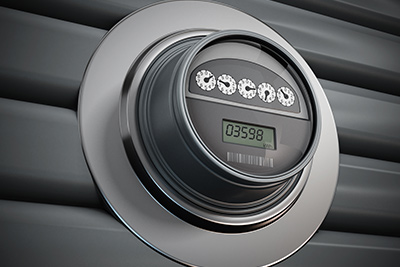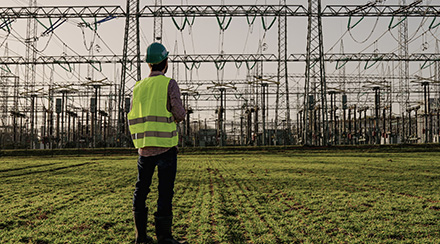What Is a Smart Meter?
You may already be using smart technology inside your home – electronics, appliances, smart thermostats and lights are increasingly common. What makes these devices “smart” is their ability to communicate in real time with other technology systems, allowing for a more interconnected home. Smart technology also offers lots of ways to monitor and reduce your energy use.
But you may also be using smart technology just outside your home – perhaps without even knowing it. Energy utilities have been installing “smart meters” on homes for years, replacing old fashioned electricity meters with the latest technology.
What Is a Smart Meter?

At a glance, a smart meter looks similar to the electricity meters that have been attached to home exteriors for decades. Smart meters also perform the same central function: tracking a home’s electricity consumption to allow for accurate billing. But unlike their predecessors, smart meters do a whole lot more.
Smart meters track energy consumption in increments, sometimes as short as 15 minutes. This provides a greater quantity and quality of data, which can be useful in identifying opportunities for energy savings. They also transmit this data to energy utilities wirelessly, eliminating the need for meter readers going door-to-door.
What Are the Benefits of Smart Electric Meters?
The expanded capabilities of smart meters allow electrical utilities and energy consumers to both do more. Here’s how they can make a difference for you as a customer:
- Real-time reporting of power outages. It wasn’t that long ago when electrical utilities relied on customers to report power outages and other electrical problems. But with a growing network of smart meters, utilities can detect even the most limited power outages almost instantaneously, shortening the time it takes to get power restored.
- No need for meter readers. Because smart meters transmit their data wirelessly, utility company employees should only need to set foot on your property if there’s a problem with your electrical lines or equipment. Eliminating meter readers also frees up electrical utility personnel to focus on more urgent tasks like power restoration and maintenance.
- Greater detail in energy use data. While smart meters cannot break down your energy consumption by appliance, they can break down your overall energy use by the time of day. Depending on where you live, you may be able to access this data to gain insight into which hours present the best opportunities to conserve energy.
- Time-of-day pricing. Incremental data tracking also creates more options for how electricity is billed, such as pricing plans in which electricity is cheaper during off-peak hours. With a time-of-day pricing plan, you can save by delaying energy-heavy tasks like laundry and dishwashing until later in the day.
Smart Meters Can Help Combat Climate Change

The enhanced energy data that many customers can access with the help of smart meters can reduce overall energy demand by helping customers make more informed energy choices. The availability of time-of-day pricing can help further by smoothing out energy consumption so that utilities can avoid firing up supplemental power plants to meet peak demand. Reducing and distributing this demand is extremely helpful to electrical utilities as they work to minimize their use of fossil fuels in electricity generation.
When energy utilities use less fossil fuel, they produce fewer greenhouse gas emissions, which slows the advance of climate change. It also helps utilities avoid the need to construct new fossil fuel-burning power plants – and because the costs of that construction are typically passed along to customers in the form of higher retail electricity rates, it helps keep energy affordable.
Looking for Something Specific?
Select a category to find resources for topics that interest you.
Select Category

Related Articles:

How to Read Your Energy Bill
When’s the last time you really looked at your energy bill? If you ever want to know exactly where your money is going – or if you might be able to save on energy costs – you should spend a few minutes taking a deep dive into your latest energy bills.
Read Article
What’s the Difference Between Utilities and Suppliers?
In a competitive energy market, suppliers can compete with each other and often the utility for customers. Learn the differences between utilities and suppliers and the parts that both play in getting energy to your home.
Read Article
What Are the Benefits of a Retail Energy Supplier?
If you live in a state with a competitive energy market, you probably have your choice of several suppliers that are competing to win your business. Learn why signing up with one of these suppliers could benefit you.
Read ArticleMost Popular Articles

Energy Plans to Fit Your Lifestyle
NRG offers electricity and natural gas plans with perks like cash back, travel rewards and more, so you can find a plan that fits your home and family.
What Is a Smart Meter?
You may already be using smart technology inside your home – electronics, appliances, smart thermostats and lights are increasingly common. What makes these devices “smart” is their ability to communicate in real time with other technology systems, allowing for a more interconnected home. Smart technology also offers lots of ways to monitor and reduce your energy use.
But you may also be using smart technology just outside your home – perhaps without even knowing it. Energy utilities have been installing “smart meters” on homes for years, replacing old fashioned electricity meters with the latest technology.
What Is a Smart Meter?
At a glance, a smart meter looks similar to the electricity meters that have been attached to home exteriors for decades. Smart meters also perform the same central function: tracking a home’s electricity consumption to allow for accurate billing. But unlike their predecessors, smart meters do a whole lot more.
Smart meters track energy consumption in increments, sometimes as short as 15 minutes. This provides a greater quantity and quality of data, which can be useful in identifying opportunities for energy savings. They also transmit this data to energy utilities wirelessly, eliminating the need for meter readers going door-to-door.
What Are the Benefits of Smart Electric Meters?
The expanded capabilities of smart meters allow electrical utilities and energy consumers to both do more. Here’s how they can make a difference for you as a customer:
- Real-time reporting of power outages. It wasn’t that long ago when electrical utilities relied on customers to report power outages and other electrical problems. But with a growing network of smart meters, utilities can detect even the most limited power outages almost instantaneously, shortening the time it takes to get power restored.
- No need for meter readers. Because smart meters transmit their data wirelessly, utility company employees should only need to set foot on your property if there’s a problem with your electrical lines or equipment. Eliminating meter readers also frees up electrical utility personnel to focus on more urgent tasks like power restoration and maintenance.
- Greater detail in energy use data. While smart meters cannot break down your energy consumption by appliance, they can break down your overall energy use by the time of day. Depending on where you live, you may be able to access this data to gain insight into which hours present the best opportunities to conserve energy.
- Time-of-day pricing. Incremental data tracking also creates more options for how electricity is billed, such as pricing plans in which electricity is cheaper during off-peak hours. With a time-of-day pricing plan, you can save by delaying energy-heavy tasks like laundry and dishwashing until later in the day.
Smart Meters Can Help Combat Climate Change
The enhanced energy data that many customers can access with the help of smart meters can reduce overall energy demand by helping customers make more informed energy choices. The availability of time-of-day pricing can help further by smoothing out energy consumption so that utilities can avoid firing up supplemental power plants to meet peak demand. Reducing and distributing this demand is extremely helpful to electrical utilities as they work to minimize their use of fossil fuels in electricity generation.
When energy utilities use less fossil fuel, they produce fewer greenhouse gas emissions, which slows the advance of climate change. It also helps utilities avoid the need to construct new fossil fuel-burning power plants – and because the costs of that construction are typically passed along to customers in the form of higher retail electricity rates, it helps keep energy affordable.
Looking for Something Specific?
Select a category to find resources for topics that interest you.
Select Category

Related Articles:

How to Read Your Energy Bill
When’s the last time you really looked at your energy bill? If you ever want to know exactly where your money is going – or if you might be able to save on energy costs – you should spend a few minutes taking a deep dive into your latest energy bills.
Read Article
What’s the Difference Between Utilities and Suppliers?
In a competitive energy market, suppliers can compete with each other and often the utility for customers. Learn the differences between utilities and suppliers and the parts that both play in getting energy to your home.
Read Article
What Are the Benefits of a Retail Energy Supplier?
If you live in a state with a competitive energy market, you probably have your choice of several suppliers that are competing to win your business. Learn why signing up with one of these suppliers could benefit you.
Read ArticleMost Popular Articles

Energy Plans to Fit Your Lifestyle
NRG offers electricity and natural gas plans with perks like cash back, travel rewards and more, so you can find a plan that fits your home and family.







